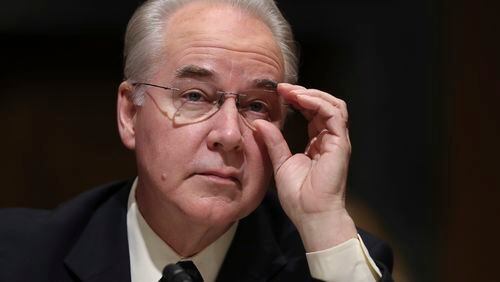The Republican leaders of a key Senate committee forced through the Cabinet nomination of Georgia U.S. Rep. Tom Price on Wednesday morning, defying a Democratic blockade to send the Trump administration’s top health pick to the Senate floor.
Taking unorthodox action, the panel kicked off a second drama-filled day on Capitol Hill as the two parties continued to feud bitterly over President Donald Trump’s top nominees.
Democrats continued to use procedural tools to draw out debate on several candidates, including boycotting a committee vote on Oklahoma Attorney General Scott Pruitt to lead the Environmental Protection Agency. Some threatened to filibuster Neil Gorsuch, Trump’s newly minted Supreme Court nominee, prompting criticism from the White House.
The Senate did confirm Exxon Mobil CEO Rex Tillerson to be secretary of state, 56-43, and the Senate Judiciary Committee agreed along party lines to advance to the floor Alabama U.S. Sen. Jeff Sessions’ nomination to be attorney general. Republican leaders also teed up a confirmation vote for Betsy DeVos to be education secretary.
The sharply partisan nature of Wednesday’s events threatened to eradicate any chance of cooperation between the new president and congressional Democrats in the years ahead. It also inched the chamber one step closer to a rules shift that critics say could perhaps permanently kill the Senate’s traditional role as a forum for more deliberate and less partisan debate.
Earlier in the day, without a single Democrat in attendance, every GOP member of the Senate Finance Committee voted to temporarily lift the panel’s rules in order to circumvent a requirement that at least one Democrat be present when voting on an executive branch nominee.
The committee then voted 14-0 to advance Price’s nomination and that of Treasury pick Steve Mnuchin to the full Senate for consideration.
The procedural maneuvering at a hastily called meeting represented an extraordinary turn of events for the tax-writing committee, which prides itself on bipartisanship and tradition.
“Long story short, we took some unprecedented actions today due to the unprecedented obstruction on the part of our colleagues,” said U.S. Sen. Orrin Hatch, R-Utah, the committee’s chairman.
Hatch and other committee Republicans were fuming over Democrats’ boycott of the Finance Committee’s initial meeting to vote on Price’s and Mnuchin’s nominations 24 hours earlier. The protest had forced Hatch to reschedule.
Democrats had cited lingering questions following separate media reports that suggested both men may have misled the committee during their confirmation hearings. They said they wanted more time to ask questions of the nominees and their associates.
“I have bent over backward to preserve (the Senate Finance Committee’s) unique status as one of the few places where Republicans and Democrats not only work together but achieve results. That all changed yesterday,” Hatch said. “Republicans on this committee showed up to do our jobs. Yesterday, rather than accept anything less than their desired outcome, our Democrat colleagues chose to cower in the hallway and hold a press conference.”
Hatch said the actions he took Wednesday were previously cleared by the Senate’s rules keeper.
Shortly after Wednesday’s actions, U.S. Sen. Ron Wyden of Oregon, the committee’s top Democrat, tweeted that Republicans should “put partisanship aside & join us in pressing for the answers.”
“The public deserves to know exactly who we are trusting with #Medicare & our economy,” Wyden continued. He re-upped a list of outstanding questions from Democrats that he said Price needed to answer. Many related to his trading of health-related stocks as a senior member of House committees that write health policy.
The reality is that Democrats are now left with little hope to stop Price’s, Sessions’ or Mnuchin’s nominations since they don’t have enough votes to filibuster on the Senate floor. At best, they can delay the Senate’s final vote by a few days.
Senate Majority Leader Mitch McConnell, R-Ky., could schedule votes on Price, Sessions and Mnuchin as soon as this week, although next week is a more likely timetable.
Georgia U.S. Sen. Johnny Isakson voted to advance both the Price and Mnuchin nominations.
“Under the rules, what we did is perfectly doable,” Isakson said in a brief interview after the vote. “Tricky, but doable and with precedent.”
Meanwhile, the nomination of DeVos, a major GOP donor and charter schools advocate, appeared to be in peril after two Republican senators announced plans to vote against her. In doing so, U.S. Sens. Lisa Murkowski of Alaska and Susan Collins of Maine became the first Republicans to break with Trump on any of his Cabinet nominees.
The GOP’s margin for error on Trump’s Cabinet picks is a thin one. The party controls 52 seats in the Senate, and 51 votes are required to approve such nominees. With Vice President Mike Pence able to cast tie-breaking votes, Republicans can only afford to lose three of their own senators on such votes if Democrats stick together.








